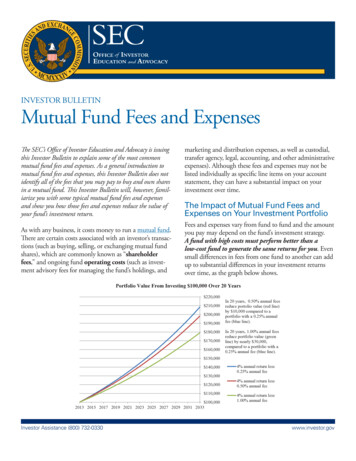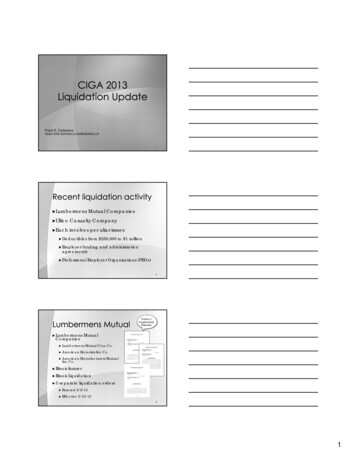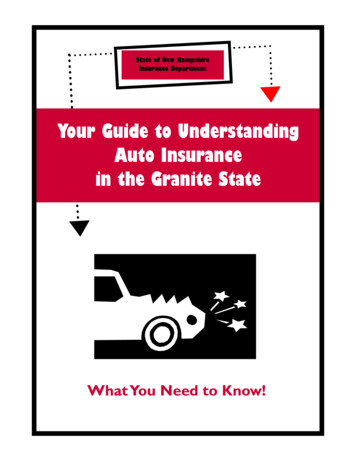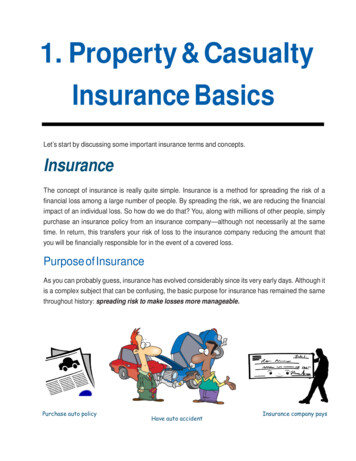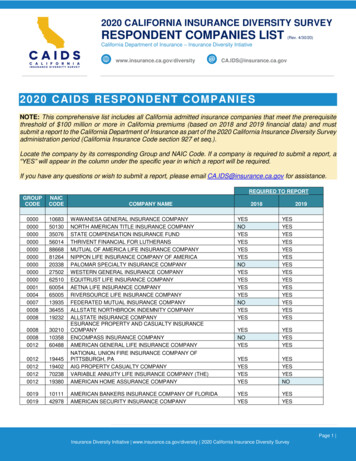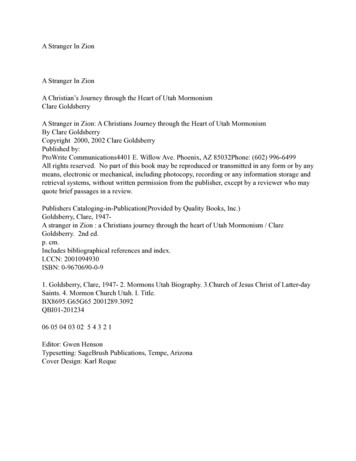
Transcription
InsuranceUnderstandingInsurance Basics
About FCACWith educational materials and interactive tools, the Financial Consumer Agency of Canada (FCAC) provides objective information aboutfinancial products and services to help Canadians increase their financial knowledge and confidence in managing their personal finances.FCAC informs consumers about their rights and responsibilities when dealing with banks and federally regulated trust, loan and insurancecompanies. FCAC also makes sure that federally regulated financial institutions, payment card network operators and external complaintsbodies comply with legislation and industry commitments intended to protect consumers.You can reach us through the FCAC Consumer Contact Centre by calling toll-free 1-866-461-3222(TTY: 613-947-7771 or 1-866-914-6097) or by visiting our website: fcac.gc.ca.2 Her majesty the Queen in Right of Canada (Financial Consumer Agency of Canada)Cat. No.: FC5-24/2011E-PDFISBN: 978-1-100-18125-7February 2011
Table of ContentsWhat is insurance?How does insurance work?Why would I need insurance?Understanding the language of insuranceLife and health insuranceLife insuranceHealth insuranceProperty and casualty (general) insuranceHome (property) insuranceTenant (renter’s) insuranceAuto insuranceBusiness insuranceCredit or debt insuranceBuying insuranceWhere can you get insurance?Choosing an insurance agent or brokerChoosing an insurance companyQualifying for insuranceHow are premiums calculated?Maintaining your coverageCancelling your coverageMaking a claimProtecting yourself from insurance scamsIf you have a complaintThe complaint 19202020221
What is Insurance?Insurance is a way of reducing your potential financial loss or hardship. It can help cover the cost ofunexpected events such as theft, illness or property damage. Insurance can also provide your lovedones with a financial payment upon your death.How does insurance work?You pay a fee called a premium, and in exchange, the insurance company agrees to pay you a certainamount of money if the event you are insuring against is covered and happens during the term ofthe policy.The details of insurance protection, such as exactly which events are covered and for how much, aredefined in your insurance policy. The insurance policy is a contract between you and the insurancecompany.Why would I need insurance?Insurance can protect you and your loved ones from financial loss if something unexpected happens.For example: Auto insurance could pay the cost of repairs to your vehicle if you have an accident. Life insurance could provide your family with money to support themselves when you die. Home or tenant insurance could pay for the cost to repair your home if there is a fire in yourhouse, condominium or apartment.The decision to get insurance will depend on your circumstances and your stage in life. For example,you may want to consider getting life insurance if you have a partner or if you decide to start a family.However, if you are a single person with no dependents, life insurance may not be as important toyou. Similarly, your provincial or territorial health plan may be enough to cover your basic medicalneeds, but if you travel outside of Canada frequently, you may want to get travel health insurance.There are many insurance products available to cover different types of risks. Auto insurance is mandatory if you own a vehicle. Most other types of insurance are optional. However, if you think that youcannot afford the potential financial loss or damage, then you should consider buying insurance.2This publication will provide you with a brief description of some of the most common types ofinsurance, what is involved in getting insurance, and what to do if you need to make a complaint.
Understanding the Languageof InsuranceHere is a list of some basic insurance terms that you may encounter as you look into insurance.TermAgentDefinitionSomeone who represents one insurance company and sells its insuranceproducts. In some cases, a life insurance agent may represent severaldifferent insurance companies.Agents must usually be licensed in the province or territory in whichthey do business.BrokerPerson or company who sells the insurance products of several differentinsurance companies.CoverageBrokers must usually be registered in the province or territory in whichthey do business.Official notice you provide to your insurer requesting to be paid for aloss or event covered by your insurance policy.Process used by insurers to get the claim information necessary inorder to decide whether to pay a claim.Amount of protection you have purchased.DeductibleThe maximum amount of money the insurance company will pay you ifyou make a claim for a loss or event covered by your policy.Amount of your claim that you agree to pay before the insurer pays the rest.ClaimClaim investigationChoosing a higher deductible will decrease the cost of your insurancepremiums because you agree to pay for a larger part of your loss.This term may be used with health, dental, home and auto insurance policies.3
TermExclusionsDefinitionThings that are not covered by your policy. Read your policy carefullyand make sure you understand what is and is not covered.For example: Some health insurance policies may exclude certain medical conditionsyou had before you applied for the insurance. A travel policy may exclude claims made if you travel to a high-risk country. A home insurance policy may exclude claims for some types of waterdamage.InsuredInsurerPolicyYou may be able to buy extra insurance, known as a rider or endorsement,to pay for risks not covered in your basic policy.Person(s) protected by the insurance policy.Insurance company that issues the insurance policy.Legal contract between you and the insurer.The policy specifies: what risks are covered by the insurer under what circumstances the insurer will make a payment to you how much money or what type of benefit you will receive if youmake a claim.PolicyholderPremiumThe amount of money or level of benefit you would receive dependson the amount of your damage or loss.Person who owns the insurance policy; usually, but not always, the insured.Amount you pay to buy insurance.The premium is usually paid monthly, quarterly or annually. The amountof your premium may change over time.4
TermRiderRiskDefinitionClause or term added to your insurance policy to provide protection, foran additional cost, for risks not covered in a basic policy. Also known asan endorsement.Check with your insurer to find out what is and is not covered by yourpolicy and for what risks you might need extra coverage.Probability that an insured event, such as loss, injury or death, will happenwhile your policy is in effect.Life and Health InsuranceHere is a list of some insurance terms that you may encounter as you look into life and health insurance.TermBeneficiary orbeneficiariesDefinitionThe person(s) named on the life insurance policy who will receive thedeath benefit when you die. For example, you may want to name yourspouse or child as the beneficiary of your life insurance policy.Beneficiaries may be revocable or irrevocable.If the beneficiary is revocable, the policy owner can change the beneficiaryat any time without advising the beneficiary.BenefitCash valueIf the beneficiary is irrevocable, the policy owner must have the irrevocablebeneficiary’s written permission before making beneficiary changes.Amount that the insurer will pay you if the insurer accepts your claim.Cash amount that the life insurer pays to the policyholder when a lifeinsurance policy is cancelled, or that is added to the face value of theinsurance policy and paid to the beneficiary upon the insured’s death.It may also be possible to take out a loan against the cash value of the policy.This term is normally used with a permanent life insurance policy.5
TermDeath benefitMaterial factsDefinitionAmount that the insurer will pay your beneficiary or beneficiaries uponyour death.This term is normally used with a life insurance policy.Things you know that could affect an insurance company’s decisionabout whether to insure you and what price (premium) you will pay.For example, if you are applying for life insurance, you need to tell theinsurer if you smoke.Pre-existingconditionRescission rightIf you do not tell the insurer about material facts, the insurer couldcancel your policy and refuse to pay any claims.Medical condition you know you already have before you apply forinsurance.A policyholder’s right to cancel the insurance policy with the insurancecompany within 10 days of receiving the policy and to be refunded anypremiums paid.Life insuranceLife insurance can provide a financial payment to your family and loved ones upon your death. Whenyou purchase a life insurance policy, you name a beneficiary who will receive the death benefit specifiedin the policy upon your death. You can name either a revocable or irrevocable beneficiary. Regardlessof the type of beneficiary you name, your beneficiary will receive the death benefit tax-free.You may also choose to leave the money to your estate or to a trust. However, if you leave the deathbenefit to an estate or trust, it will be subject to taxes when the estate is settled.There are two main types of life insurance: term and permanent.Term life insurance provides coverage if you die within a specific period of time, unless you do notpay your premium.Term life insurance premiums are generally less expensive than permanent life insurance premiums.6
Premiums are usually fixed for the length of the term, often at intervals of five or ten years. However,your premiums may increase when you renew the policy. For example, premiums would increaseevery five years on a five-year renewable policy. Most life insurance policies will only cover you up toa maximum age. For example, you may not be able to buy coverage once you reach age 75.The death benefit is paid if your death occurs during the term or duration of the policy. For example,your policy will pay the death benefit to your beneficiary if you die before the policy expires. However,once the term ends, the coverage ends, and you or your beneficiaries will not receive any payment.Most term insurance policies do not accumulate a cash value.Permanent life insurance provides coverage throughout your lifetime, unless you fail to pay yourpremiums.At first, premiums are usually higher than for term life insurance policies, but may be lower than termpremiums in later years.Permanent life insurance policies generally accumulate a cash value that is either added to the facevalue of your policy and paid out upon your death, or returned to you if you cancel your policy. Mostpolicies will also allow you to take a loan against the cash value of your policy. Loans that you havenot repaid reduce both the death benefit and any cash value.The two most common types of permanent insurance are whole life and universal life policies. Whole life insurance is a type of permanent life insurance that guarantees the amount of yourpremiums.Your premiums will not change as you get older, and your policy will often have a guaranteedminimum cash value. The death benefit, or amount paid out upon your death, is also guaranteed. Universal life insurance is a type of permanent life insurance that combines life insurance withan investment account. The investment account has a cash value. Withdrawals, as well as loans,may be permitted.You can increase or decrease your premiums within the limits specified in your insurance policy.You can also select how your premiums are invested.The death benefit and cash value of your investment account may increase or decrease dependingon the types of investments you choose to hold in your account and the returns on those investments.The premiums you are required to pay could increase if returns on your chosen investments fall.7
Evidence of insurabilityLife and health insurance companies may require that you complete a detailed medical questionnaireor exam, also called Evidence of Insurability, before approving you for a policy. In addition to askingyou about your past health history and lifestyle, the insurance company may also ask that you undergomedical testing such as saliva or blood tests.However, some types of insurance may require only that you sign a general statement about yourhealth or respond to a short medical questionnaire to be approved for coverage. The insurer mayconduct a medical history check or request evidence of insurability to confirm whether the insuredqualified for coverage after a claim occurs.If the insurance company conducts a claim investigation after you or your beneficiary submitsa claim, and determines that the medical questions were not answered properly or that theinsured did not include material facts, the insurer could void the contract and refuse to pay theclaim even though you have already paid premiums.If your claim were denied, your insurance company would cancel the policy and the premiums paidwould be returned to your beneficiary or beneficiaries. This process is known as claim investigationand may apply to life insurance, mortgage life insurance, credit balance insurance or disability insurance.For most types of life insurance, the insurance company cannot increase your premiums based on achange of health after your policy is issued.Health insuranceThere is a variety of health insurance products available that could help you: pay for services that your regular health care plan does not cover supplement your income if you suffer a major illness or severe injury pay for your medical expenses if you become ill while on vacation.Check your policy to find out if there is a deductible or if the amount payable is limited to a maximumpercentage of the overall claim, or a maximum annual amount.8
Supplementary health insurance pays for health services, such as prescription drug and dentalservices, not generally covered by provincial and territorial government health plans.Before buying supplementary health insurance, check your employer’s benefits plan to make surethat you do not buy coverage you already have. For example, you may already have dental coveragethrough your employer’s plan.Disability insurance provides coverage if you cannot work temporarily or permanently due to a injuryor illness, such as loss of a limb, a heart attack or an operation.Travel medical insurance pays for medical treatment while you travel outside of Canada.The policy may not provide coverage for medical conditions you had before applying for coverage,so read the policy carefully.Critical illness or trauma insurance pays a one-time lump-sum payment if you are diagnosed with acritical illness that is specified in your policy, such as cancer or Alzheimer’s disease.There are often exclusions, so read the policy carefully. Be sure you know what is and is not covered.Long-term care insurance provides coverage if you enter a long-term care facility such as a nursing home.Property and Casualty (General)InsuranceProperty insurance can provide coverage for loss or damage to: your home or personal possessions your car your business.Casualty insurance can provide coverage against legal liability for losses caused by: injury to other people damage to the property of others.9
Property and casualty insurance is also known as general insurance. Here is a list of some key termsthat you may encounter as you look into property and casualty insurance.TermActual cash valueDefinitionThe cost of the insured item when it was new, minus depreciation (lossof value due to the age and condition of the item). This is one methodof determining the amount of money the insurer will reimburse youif you make a claim.How the depreciation is calculated depends on the item insured andthe insurance company.Replacement valuePremiums for policies with actual cash value are generally less expensivethan those for policies with replacement value.The actual cost to replace an item destroyed or damaged in the eventof a covered loss. This is another method of determining the amount ofmoney the insurer will reimburse you if you make a claim.Premiums for policies with replacement value are generally moreexpensive than those for policies with actual cash value.Home (property) insuranceFor most people, a home is the largest single purchase or investment they will make. Home insurancecan help protect your home or contents in case of theft, loss or damage.Home or property insurance pays for damage to or loss of your house, condominium, or property.It can also protect against damage, theft or loss of your personal possessions. Home insurance mayalso cover personal property stolen from your vehicle.Your home insurance policy may also cover damage or injury to others who visit your home or property.For example, if someone slips and falls in your driveway, that person may be able to make a claimagainst you for the expenses incurred as a result of damage or loss caused by the injury.Home insurance can also pay for accidental damage you cause to others’ property. For example,if a fire starts in your house, your home insurance can pay for the damage the fire causes to yourneighbour’s house.10Home or property insurance is usually required as a condition of getting a mortgage. Most financialinstitutions will not give you a mortgage without proof of insurance.
Tenant (renter’s) insuranceIf you live in an apartment or rent your home from someone else, you should still look carefully athow tenant insurance could protect you.Tenant insurance protects you against damage to or loss of your possessions if you rent or lease yourapartment or home from someone else. Tenant insurance may also cover personal property stolenfrom your vehicle.Tenant insurance can also pay for accidental damage you cause to any part of the apartment buildingor home you are renting, and for injury caused to visitors.For example, if the bathtub overflows and floods your apartment, tenant insurance can pay for thedamage caused to your apartment, the apartment building and other tenants or their property.When shopping around for property and casualty insurance, find out if the quotes you receiveare based on actual cash value or replacement value. The amount of money you receive fromyour insurer for a covered loss will depend on whether your coverage is for actual cash valueor replacement value. Actual cash value policies are usually less expensive than replacementvalue policies, but generally pay less when you make a claim.Auto insuranceAuto insurance is mandatory if you own a vehicle. All Canadian provinces and territories requiredrivers to have at least liability and accident benefits/bodily injury coverage. Some provinces mayrequire additional coverage.Liability insurance covers losses (such as injury or death) that your vehicle causes to other people ordamage to their property. It does not cover the cost of repairs to your own vehicle.Accident benefits/bodily injury insurance covers the cost of your own medical expenses and loss ofincome when you are in an accident.You can also purchase optional insurance such as collision and comprehensive coverage.Collision insurance covers the cost of repairing or replacing your vehicle if you hit another vehicleor object.11
Comprehensive insurance covers the cost of repairing or replacing your vehicle due to other typesof damage or loss, such as vandalism or theft. Comprehensive insurance does not cover loss or damageto your vehicle if you hit another vehicle or object in a collision.Most auto insurance policies do not cover the loss of personal possessions, such as golf clubs, clothingor personal electronics, stolen from your vehicle. Personal possessions stolen from your vehicle areusually covered by your home or tenant insurance. Check your home insurance policy to find out if itprovides coverage for theft of personal items from your vehicle.Business insuranceIf you have a home-based business or work from your home, you should consider getting businessinsurance. Business insurance can protect you against loss or damage to physical property or the lossof your business’ ability to operate and generate income.Commercial property insurance pays for damage to or loss of your business premises. It also protectsagainst damage, theft, or loss of the business property or inventory.Public liability insurance protects your business against third-party liability claims. For example, adelivery person who slips and falls at your place of business may be able to make a claim against youfor the expenses and the effect of an injury.Errors and omissions insurance protects service providers against claims made against them becauseof a mistake they may have made.Home or tenant insurance will generally not pay for claims related to your home-based businessor business activities that take place in your home. For example, inventory stolen from yourhome will not be covered by your home or tenant insurance policy. If you have a home-basedbusiness or conduct business in your home, it is important that you declare it to your insurerand arrange for business or commercial coverage.12
Credit or Debt InsuranceLife, health, home and auto insurance are the most common types of insurance products, but therealso insurance products available to cover you if you become unable to pay your insurance premiumsfor reasons such as illness, accident or death.Mortgage disability insurance makes mortgage payments to your lender for a specified time if youcannot work due to a severe injury or illness.Mortgage default insurance protects the mortgage lender if you cannot make your mortgage payments.Mortgage default insurance is required by law if your down payment is less than 20 percent of thepurchase price of the home.Mortgage default insurance protects the lender. It does not protect you as a homeowner. If youdo not make your mortgage payments, your lender can take ownership of your property.Credit protection insurance makes the minimum monthly payments on a credit card, loan, line ofcredit or other debt for a specified time if you cannot work due to severe injury or illness.You will still be responsible for paying the balance when you recover or after the coverage period ends.Mortgage life insurance pays the remaining balance on your mortgage to the lender in the event ofyour death.As you pay down your mortgage over time, the amount that the insurer will pay you if you die (i.e.the outstanding mortgage balance) is reduced. However, the payments generally remain the same.Be aware that mortgage life insurance may be subject to claim investigation and often has very strictexclusions relating to pre-existing conditions. Read your policy carefully and make sure you understandwhat is covered.13
Credit balance insurance pays the remaining credit card balance, bank, line of credit or other debt infull, to the lender at the time of your death. Be aware that credit balance insurance may be subject toclaim investigation and often has very strict exclusions relating to pre-existing conditions. Read yourpolicy carefully and make sure you understand what is covered.If you are considering buying mortgage life insurance or credit balance insurance, compare thecoverage offered with other options, such as a term life insurance policy.Buying InsuranceMake sure you get the right insurance to meet your needs, which may change over time. Be sure toevaluate your situation from time to time, as you may need to update your policy after major lifeevents such as: starting a family buying a home starting a business buying a new vehicle.Your decisions about the type and amount of insurance you get will depend on your situation, yourbudget, your personal beliefs and the value of what you are insuring.Know what insurance coverage you already have so that you do not buy unnecessary coverage. Forexample, your employer’s benefits plan may offer supplementary health coverage, or travel healthinsurance may be included if you pay for your trip with a credit card.TipYou may be able to get better prices if you are a member of a union, association or club. Manyinsurers offer special lower rates for group coverage. However, coverage usually ends whenyou are no longer a member of the group or reach a certain age.14
When buying insurance: Evaluate your situation to determine what risks you may need to insure against. You may also wishto have an emergency savings fund to protect you against some of the smaller financial risks. Shop around and compare both the coverage and the prices. Some policies may be cheaper butmay not offer the same level of service or coverage. Be sure to get enough insurance. If you make a claim, your insurer will only pay up to the maximumamount insured by your policy. When deciding how much insurance you night need, consider thevalue of the item you are insuring and the full financial impact of paying for the loss or event youare insuring against. For those types of insurance that have a deductible, determine how much of a deductible youcan pay if you need to make a claim. Generally, a higher deductible will reduce your premiums,but you will need to pay the full amount of the deductible if you make a claim.Before signing, read the policy carefully. Make sure you understand what is and is not coveredby your policy.Where can you get insurance?You can buy insurance from: an insurance agent an insurance broker an insurance company.Most types of insurance can also be purchased over the phone or Internet or by mail; however, lifeinsurance is usually purchased from a licensed agent.Other types of insurance, such as mortgage default insurance or credit insurance, are usually offeredby the lender when you apply for financing.15
TipYou may be able to get a discount if you buy more than one type of insurance policy from thesame insurance company—for example, you may get a discount if you buy your home and autoinsurance from the same insurance company.Choosing an insurance agent or brokerBefore choosing an agent or broker: Shop around. Ask friends and family if they can recommend someone they have dealt with. Ask the agent orbroker to provide references from other clients. Ask about the insurance agent’s or broker’s qualifications. Find out what training the agent orbroker has received.For example, if you are dealing with a life insurance agent, ask whether he or she has passed theLife Licence Qualification Program (LLQP). Find out if the agent or broker belongs to a professional association.For example, does the agent or broker belong to Advocis, the Financial Advisors Association ofCanada or the Insurance Brokers Association of Canada? Contact the insurance regulator in your province or territory to confirm that your agent or brokeris licensed or registered to do business in your province or territory.Dealing with a licensed agent or registered broker will help to ensure that he or she is properlytrained and has the resources to provide you the insurance services you may need.A list of provincial and territorial insurance regulators is available on FCAC’s website at fcac.gc.ca. Find out how long the agent or broker has been in business and what services the agent orbroker provides after selling you the policy.16
TipNever pay a fee to insurance agents or brokers. This is not a normal practice in the insuranceindustry and could be a scam. Licensed insurance agents and brokers receive payment from theinsurance company and generally do not charge you a fee.However, agents and brokers will often accept premium payments on behalf of an insurer. If you paypremiums to an agent or broker, the cheque or payment should be made out to the insurer and notto the broker or agent.Choosing an insurance companyRegardless of how you buy insurance, your policy will be issued by an insurance company.Before accepting an insurance company recommended to you by your agent or broker or choosingan insurance company yourself, contact the insurance regulator in your province or territory toconfirm that the insurance company is licensed to do business in your province or territory. Dealingwith a licensed insurance company will ensure that you have access to an independent disputeresolution system if you need to file a complaint.Make sure the company is a member of Assuris (www.assuris.ca) or PACICC, the Property and CasualtyInsurance Compensation Corporation (www.pacicc.com).If your life insurance company fails, Assuris protects your benefits up to certain amounts. A life insurancecompany authorized to sell insurance policies in Canada is required by the federal, provincial and territorialregulators to become a member of Assuris.If your property and casualty insurance company fails, PACICC protects your benefits up to certainamounts. A property and casualty insurance company authorized to sell insurance policies in Canadais required by the federal, provincial and territorial regulators to become a member of PACICC.17
Qualifying for InsuranceInsurance companies will evaluate whether they will issue a policy based on certain criteria, such as: your age your medical history any previous claims you have made the amount of coverage you are requesting.No matter what type of insurance you are applying for, be sure to answer all questions on theapplication fully and honestly. If you don’t, your policy could be cancelled and any claim you makein the future could be refused.How are premiums calculated?Your premium is based on the probability that you will make a claim. Factors such as the ones listedpreviously may affect the cost of your premiums. Insurers usually charge higher premiums to peoplewho they think are more likely make a claim. People whom insurers consider less likely to make a claimwill usually pay lower premiums. For example, if y
Cat. No.: FC5-24/2011E-PDF ISBN: 978-1-100-18125-7 February 2011 With educational materials and interactive tools, the Financial Consumer Agency of Canada (FCAC) provides objective information about . Life and health insurance 5 Life insurance 6 Health insurance 8 Property and casualty (general) insurance 9 Home (property) insurance 10 Tenant .


